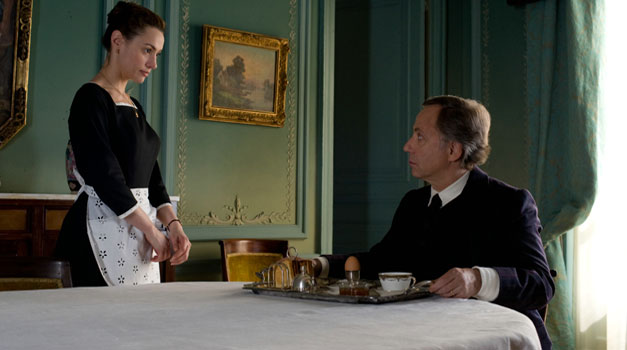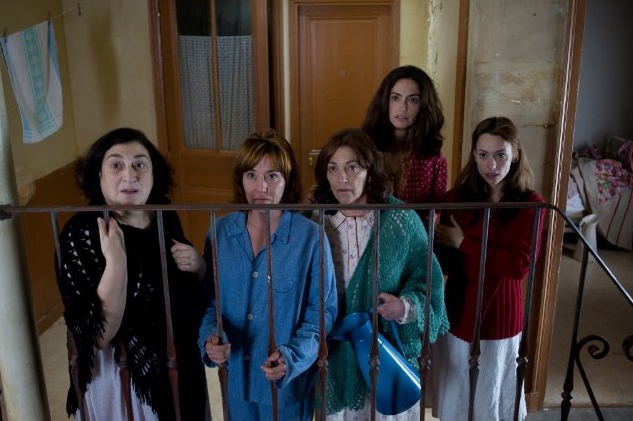French filmmaker Philippe le Guay has been writing and directing films for over 20 years, yet his most popular work is his latest move The Women on the 6th Floor.
Set in 1960s the Paris, the film stars acclaimed actor Fabrice Luchini as an upper middle class stockbroker whose bourgeois lifestyle is changed when he falls in love with his Spanish maid (Natalie Verbeke) and her approach to life.
Philippe le Guay spoke to Matt’s Movie Reviews about The Women on the 6th Floor.
Enjoy!
Where did the idea originate to make a comedy featuring a clash of these two different cultures?
I would say the origin comes from some memories I had when I was a child. There was a Spanish maid at home for a few years, and I was very little at that time. I was between the age of 2 to the age of 5and her name was Loures and she was constantly speaking to me in Spanish. My mother said that I hardly spoke French. When I was little I was mixing both French and Spanish.
Unfortunately she had to get married and went back to Spain, but I realised many years later I discovered there were many friends among me and people I knew that also had Spanish nannies, then I realised there was this whole move of immigration of 100,000 Spanish women that came in the ‘60s in France, that I realised this would be a great opportunity for a film.
I like hidden history and the little events in history like the presence of Spanish women doesn’t affect really the big march of history, but it creates situations that are enjoyable and could be the beginning of a film.
Did you ever meet any former Spanish housemaids who worked in France during the ‘60s?
Yes. There are still a few women that came in France in the ‘60s and wanted to stay a few years and happened to stay there all of their lives. They would go back once in a while to Spain, but they found more freedom and more understanding at least until ’75 when Franco died, they felt more free to be in France avoiding the influence of either the father in Spain because it’s very patriarchal, or the husband if they had one. So they all kept great memories of those years, even if it was a tough life.
 |
"I guess the reason why I wanted to make this film, especially with Spanish actresses, is that I always loved Spanish culture." - Philippe le Guay |
Your main character Jean-Louis is played by did you Frabice Luchini. Di you always have in mind to play that character?
Well at the beginning it was a young boy’s point of view. It was the story of a little boy who happened to discover the Spanish women up on the 6th floor, but we couldn’t go on producing the film with a boy who was not a leading actor.
Then the film stopped. A few months later I said “Why don’t I exchange the little boy for the father instead?” At that time it was really Frabice and nobody else, because he has this innocence and this kind of ability to wonder and be curious. I think he is the perfect actor to play that.
Your lead actor Natalie Verbeke…that is the first time I’ve seen her in a movie. Were you familiar with her work before casting her?
Yes. She played in an Argentine film, as she was born in Argentina and spent all her life in Spain. She played in a very good film called The Son of the Bride directed by Juan Jose Campanella, who won the Oscar for a foreign film recently (The Secret in Their Eyes).
Anyway, I met her and met many other actresses including very famous ones and obviously she had the best combination of beauty and at the same time a kind of pride. She is remote but that is one thing I like about her…when you see her you don’t fall in love with her instantly. You begin to like her and then the more she is on screen the more attractive she is.
Frabrice Luchini’s character falls in love with Spanish culture. What elements of Spanish culture did you fall in love with while writing the film?
Well, I guess the reason why I wanted to make this film, especially with Spanish actresses, is that I always loved Spanish culture, I love to go to Spain…I used to go a lot to the south west of France near the Spanish border. I love many things that are connected with Spain like of course the music, the food, the culture and also that kind of mixture of pride and violence combined with a great sensuality.
So everything put together…the reason why I wanted to do the film was to just spend a few weeks with six Spanish actresses. (laughs)
The film deals with many social and political issues while telling its love story. How difficult is it to blend discussion about Franco’s Spain within a romantic comedy movie?
Well, I understand your question….there is this toughness about the Franco regime where these women come from and I don’t think we should avoid mentioning it.
There is one character who is played by Lola Duenas, her name is Carmen in the film and she stands for republican ideals and of course she is against the Franco dictatorship, and in a way she has a tragic destiny in the film because her parents were killed. Of course the meeting with Jean-Louis is a key moment for him because he suddenly realises that his bourgeois comfort is confronted by something which is big, something real and something violent.
So this doesn’t deal with comedy here, but it is a step forward which is important to his progressive awareness of who these women are.
When he finds out where these women are coming from and what they’re running from, he feels some sympathy for them as well.
Yes.
 |
"The Spanish women in the film are really seen as princesses. For me they have a sense of dignity. They are wise and noble and they are definitely the heroines of the film. " - Philippe le Guay |
The Catholic Church plays a big part in the lives of these women. What type of role did the Church have in helping Spanish immigrant integrate into French society?
It was like a social platform. They would help the Spanish women in finding jobs, because in the neighbourhood the French bourgeois women know that they would come to church and it was the right place to go and put forward offers, like “I’m looking for a young woman for 6 months” or whatever and they would supply the offers.
In those days the Spanish church was really a kind of spot where people met and it was part of that social…how did you say…
Integration…
Yes! Integration and gathering and also helping them to be part of society.
I read that there was a screening in Spain a few months ago. What was that experience like?
I wasn’t there unfortunately because I already was travelling. It was in Malaga and we won the prize of the public in Malaga, but I know the distributor has mixed feeling. He thinks that the film might be very popular but at the same time is afraid of giving the image of Spanish women seen as domestic will hurt certain sensibilities in Spain. So anyway, we’ll see what happens.
That sounds silly. It sounds like they are trying to ignore a certain aspect of their history.
Yes. Moreover the Spanish women in the film are really seen as princesses. For me they have a sense of dignity. They are wise and noble and they are definitely the heroines of the film. On the other hand the comment on the French bourgeoisie is satirical. So I don’t know what is going to happen. We’ll see.
There is a running joke in the film where Jean-Louis needs his egg boiled in a certain way. You spoke of a certain autobiographical context with you own family having a Spanish maid. Did you get this from perhaps your father?
No (laughs). That was really…the egg is the thing we find out that is very obvious that probably this man never had an egg cooked the proper way, because in a way in his family nobody pays attention to him. We understand that his mother never really loved him, his father didn’t care and in a way he is an orphan. He never really been considered...even his wife is nagging at him.
Suddenly out of the blue there’s this young woman coming from Spain who managed to give him a perfect boiled egg, and suddenly something is enlightened in his everyday life.
I guess that goes with the saying “The way to a man’s heart is through his stomach”.
Yes (laughs). It’s true.
|
